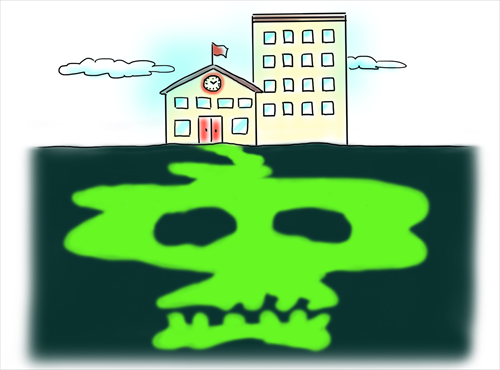Toxic schools raise ‘Love Canal’ spectre

Illustration: Liu Rui/GT
To residents of the US town of Niagara Falls in the 1950s, everything seemed good. The city was a boom town, and with the new residents and new jobs, new schools were needed. But land was short, and that led to the fatal decision to build new schools on purchased land which had been used to bury toxic waste. In the 1970s, investigative work by local reporters exposed the toxic site, known as the Love Canal, which became a public health scandal.
The latest incident of some 500 students being poisoned by underground toxic chemicals in Changzhou city in southern China's Jiangsu Province threatens to be China's own version of the Love Canal. The students moved in to the new campus late last year and complaints about suspected pollution have been recorded since early this year.
Frankly speaking, a case like this was not completely unexpected, given the rampant air, water and soil pollution in China. Still, it's shocking to see not only the events, but the emptiness of the government response so far.
Immediately after the CCTV report of the incident, the city government of Changzhou issued a statement vowing "zero tolerance" of pollution. It rang hollow because, if that's the case, the incident would have never taken place. The statement says that proper measures were taken, pollution has been dealt with, and the school is operating normally. The underlying message? Everything is under control. Case closed.
The response from the local government is deeply disturbing. Despite the fact that hundreds of youngsters were affected, despite the revelation that the amount of one of the pollutants, chlorobenzene, exceeded the national standard by 100,000 times, and despite the central government speaking of a thorough investigation into the case, the local government had the audacity to claim that things are "normal." Reading between the lines, the local government seems to remain obsessed with maintaining social stability, which it cares about far more than the well being of the people.
The school management, which published a similar statement before the news coverage, also appears to be in a hurry to turn the page. An earlier report said that the area near the school was considered unfit for construction, but the school went ahead with the new campus anyway and has been accused of playing down the concerns of parents and students over health problems. CCTV calls it a typical case of "build first and assess later," as the construction of the new school started months before the environment assessment came out.
Besides the fair share of blame to the local government, the chemical plants previously located near the school should not escape public scrutiny. Plants may have been relocated or closed, but often there's an environmental impact that can't be overlooked. In the CCTV video clip, former workers of those plants were reported to have been ordered to dump or bury chemical waste in the underground. An investigation into this practice is probably necessary too.
The case in Changzhou underscored the stark reality of our groundwater pollution. Reports of chemical waste being pumped into rivers are common throughout the country. The recently published data by the Ministry of Water Resources showed that some 80 percent of water in shallow groundwater wells in parts of China is regarded as unfit to drink. It's not an exaggeration to call it a crisis.
Food safety is one of the top issues of concern for the Chinese public, which has been scarred over the recent years by scandal after scandal - from the melamine-tainted infant formula in 2008 to the loose oversight of children's vaccines. The practice of "pollute first and treat second" was part of the development path of today's rich countries. Unfortunately, China has not succeeded in avoiding the growth model.
To this day, the Love Canal scandal in the US is remembered as a "national symbol of a failure to exercise a sense of concern for future generations." For China, the Changzhou incident should serve as a wake up call. It goes beyond the proper handling of this one incident. It's about setting a precedent of how to constructively engage the public, the industrial sector and local governments to treat and prevent pollution.
The author is a commentator on current affairs with China Radio International. opinion@globaltimes.com.cn Follow us on Twitter @GTopinion